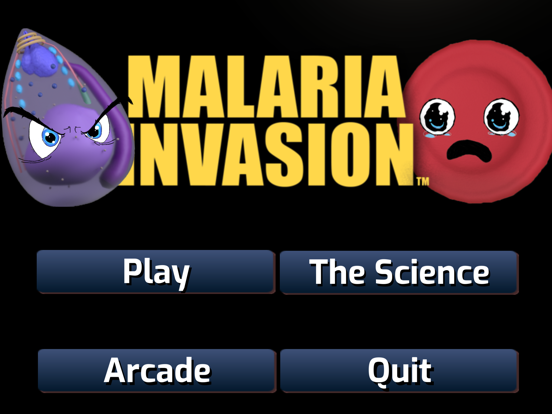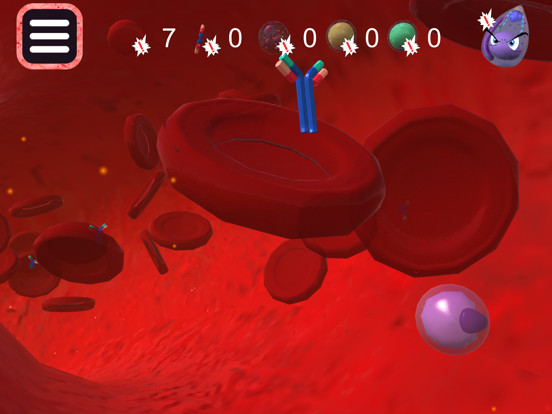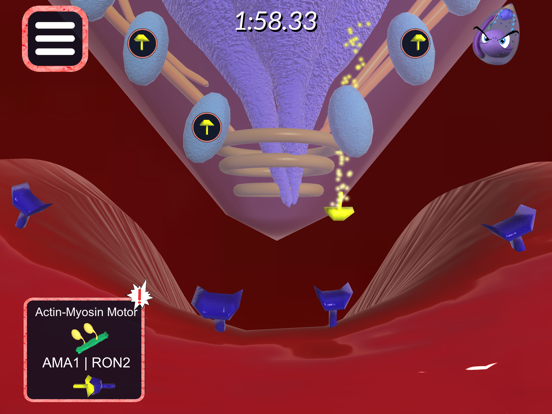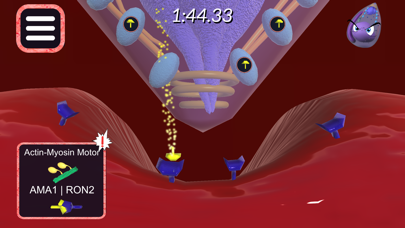
Malaria Invasion™
Free
2.1for iPhone, iPad and more
9.9
5 Ratings
Drexel University
Developer
144.2 MB
Size
Oct 4, 2022
Update Date
Education
Category
12+
Age Rating
Age Rating
Malaria Invasion™ Screenshots
About Malaria Invasion™
Follow us on Twitter and Instagram: @Drexel_IMMID, #IMMID, #MalariaInvasion
Visit our website: drexel.edu/medicine/immid-cbpd
Purpose:
Malaria Invasion is the second in a series of educational mobile games developed by the Institute for Molecular Medicine and Infectious Disease at Drexel University College of Medicine, to introduce players to the dynamic world of infectious disease. The first mobile game was CD4 Hunter™. These games are primarily intended for use as a learning tool to supplement the biomedical science curriculum in higher education, by intersecting science with engaging game mechanics.
Game Features:
Malaria Invasion is a 3-level game in which players take the role of the malaria parasite, Plasmodium in the blood-stage of infection. Specifically, players play as a Plasmodium merozoite that arose in the bloodstream of an individual that had been bitten by an infected mosquito.
By intersecting real science, with attractive visuals and animations, and simple gameplay, each game level teaches players about essential aspects of the complex mechanism by which merozoites invade RBCs while evading the immune system:
• Level 1, Circulation: The goal is to identify and infect as many RBCs as possible and not be detected by the immune system.
• Level 2, Attachment: The goal is to attach specific proteins produced by the merozoite to their specific receptors on the RBC. The successful protein-receptor binding will increase the intracellular calcium needed to proceed with the invasion process.
• Level 3, Invasion: The goal is to develop the tight junctions necessary to engage the actin-myosin motor and drive the merozoite into the RBC.
Learning Goals:
1. Explain the role of the Plasmodium merozoite in the progression of the blood-stage malaria infection.
2. Identify RBCs and their specific cell-surface receptors as the merozoite targets in the post-hepatic stage of the Plasmodium replication cycle.
3. Identify the key Plasmodium organelles involved in RBC invasion and define the function of essential protein ligands they secrete to facilitate invasion.
4. Explain the role of the essential ligand-receptor pairs in the process of RBC invasion by the Plasmodium
5. Correlate the evasion of the immune system with the progression of the malaria infection during the blood stage of the Plasmodium replication cycle.
6. Identify important metabolic and structural changes involved in the process of Plasmodium merozoite invasion of RBCs.
Credits:
Malaria Invasion was designed and developed by faculty of the Department of Microbiology and Immunology (Mary Ann Comunale, EdD, MS and Sandra Urdaneta-Hartmann, MD, Ph.D., MBA) at Drexel University College of Medicine, and an undergraduate student from Drexel University’s Game Design Program (John Harvey). Plasmo® was designed based on original artwork by Andrew Bishop, an Animation and Visual Effects student at Drexel University.
Lawrence Bergman, Ph.D., James Burns, Ph.D., and Akhil Vaidya, Ph.D., also faculty in the Department of Microbiology and Immunology, contributed their expertise on malaria.
Brian Wigdahl, Ph.D., Chair of the Department of Microbiology and Immunology and Executive Director of the Institute for Molecular Medicine and Infectious Disease is the Executive Producer of Malaria Invasion.
Funding for this project was provided by the Department of Microbiology and Immunology and the Institute for Molecular Medicine and Infectious Disease. Additional funding was granted by Drexel University’s Office of the Provost and the Steinbright Career Development Center.
Visit our website: drexel.edu/medicine/immid-cbpd
Purpose:
Malaria Invasion is the second in a series of educational mobile games developed by the Institute for Molecular Medicine and Infectious Disease at Drexel University College of Medicine, to introduce players to the dynamic world of infectious disease. The first mobile game was CD4 Hunter™. These games are primarily intended for use as a learning tool to supplement the biomedical science curriculum in higher education, by intersecting science with engaging game mechanics.
Game Features:
Malaria Invasion is a 3-level game in which players take the role of the malaria parasite, Plasmodium in the blood-stage of infection. Specifically, players play as a Plasmodium merozoite that arose in the bloodstream of an individual that had been bitten by an infected mosquito.
By intersecting real science, with attractive visuals and animations, and simple gameplay, each game level teaches players about essential aspects of the complex mechanism by which merozoites invade RBCs while evading the immune system:
• Level 1, Circulation: The goal is to identify and infect as many RBCs as possible and not be detected by the immune system.
• Level 2, Attachment: The goal is to attach specific proteins produced by the merozoite to their specific receptors on the RBC. The successful protein-receptor binding will increase the intracellular calcium needed to proceed with the invasion process.
• Level 3, Invasion: The goal is to develop the tight junctions necessary to engage the actin-myosin motor and drive the merozoite into the RBC.
Learning Goals:
1. Explain the role of the Plasmodium merozoite in the progression of the blood-stage malaria infection.
2. Identify RBCs and their specific cell-surface receptors as the merozoite targets in the post-hepatic stage of the Plasmodium replication cycle.
3. Identify the key Plasmodium organelles involved in RBC invasion and define the function of essential protein ligands they secrete to facilitate invasion.
4. Explain the role of the essential ligand-receptor pairs in the process of RBC invasion by the Plasmodium
5. Correlate the evasion of the immune system with the progression of the malaria infection during the blood stage of the Plasmodium replication cycle.
6. Identify important metabolic and structural changes involved in the process of Plasmodium merozoite invasion of RBCs.
Credits:
Malaria Invasion was designed and developed by faculty of the Department of Microbiology and Immunology (Mary Ann Comunale, EdD, MS and Sandra Urdaneta-Hartmann, MD, Ph.D., MBA) at Drexel University College of Medicine, and an undergraduate student from Drexel University’s Game Design Program (John Harvey). Plasmo® was designed based on original artwork by Andrew Bishop, an Animation and Visual Effects student at Drexel University.
Lawrence Bergman, Ph.D., James Burns, Ph.D., and Akhil Vaidya, Ph.D., also faculty in the Department of Microbiology and Immunology, contributed their expertise on malaria.
Brian Wigdahl, Ph.D., Chair of the Department of Microbiology and Immunology and Executive Director of the Institute for Molecular Medicine and Infectious Disease is the Executive Producer of Malaria Invasion.
Funding for this project was provided by the Department of Microbiology and Immunology and the Institute for Molecular Medicine and Infectious Disease. Additional funding was granted by Drexel University’s Office of the Provost and the Steinbright Career Development Center.
Show More
What's New in the Latest Version 2.1
Last updated on Oct 4, 2022
Old Versions
This update brings the game to more modern devices. It comes with slight gameplay improvements and visual upgrades.
Show More
Version History
2.1
Oct 4, 2022
This update brings the game to more modern devices. It comes with slight gameplay improvements and visual upgrades.
2.0.211
Jan 19, 2019
Updated minimum app requirement to iOS 12.0.
Significantly lowered App Install size.
Reduced lag when loading levels and viewing instructions.
Improved game instructions for easier navigation.
Significantly lowered App Install size.
Reduced lag when loading levels and viewing instructions.
Improved game instructions for easier navigation.
1.0
Oct 11, 2018
Malaria Invasion™ FAQ
Click here to learn how to download Malaria Invasion™ in restricted country or region.
Check the following list to see the minimum requirements of Malaria Invasion™.
iPhone
Requires iOS 12.0 or later.
iPad
Requires iPadOS 12.0 or later.
iPod touch
Requires iOS 12.0 or later.
Malaria Invasion™ supports English

































